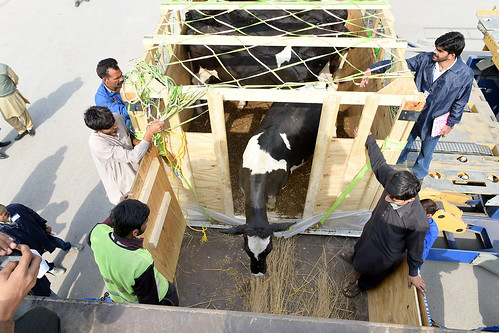
U.S. dairy cows are back in Pakistan for the first time in 17 years. More than 300 heifers arrived in Punjab Province on March 2, thanks to the efforts of USDA’s Foreign Agricultural Service (FAS). It’s hoped the shipment will be the first of many from the United States and will provide a better breed of cow for the rapidly growing Pakistani dairy industry.
Most of the dairy cows have been purchased by commercial dairy farms, but 73 Holsteins in the shipment will be delivered to a new model dairy farm that FAS has established to support the rapidly growing Pakistani dairy industry and create new opportunities for U.S. exporters.
Pakistan is among the world’s largest dairy producers and is a great opportunity for U.S. exporters. Most Pakistani dairy production comes from small, traditional farms, but modern, commercial dairies are starting to come online, as are high-yield livestock management practices.
Pakistan’s adoption of intensive production practices is expected to be a good fit for higher-producing American breeds. Similarly, additional training in herd management and health practices will enable herd managers to make the most of the genetic potential of U.S. cows.
With this in mind, FAS collaborated with Pakistan’s University of Veterinary and Animal Sciences (UVAS) near Lahore to establish the model dairy farm with funding support from the U.S. Agency for International Development. The Pattoki Training and Research Demonstration Farm will train Pakistani students, herd managers, and extension agents, demonstrating the benefits of American dairy cows and ultimately helping generate demand for additional U.S. cattle and genetics exports to Pakistan. FAS is working with Mississippi State University to teach better herd management to UVAS staff and faculty in order to help their Holsteins thrive in Pakistan’s warm climate.
The Pakistani market was closed to imports of U.S. live cattle in 2003 because of concerns about Bovine Spongiform Encephalopathy (BSE). But thanks to the work of FAS and USDA’s Animal and Plant Health Inspection Service, the market was reopened in 2015 based on United States’ classification by the World Organization for Animal Health (OIE) as a negligible risk country for BSE.



